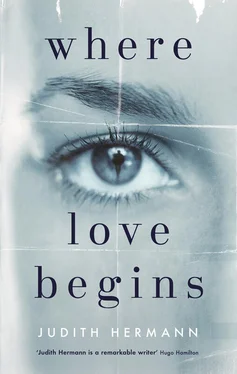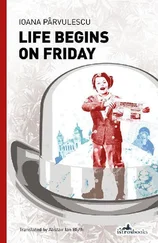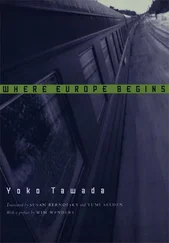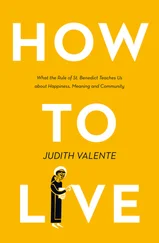*
Three days later Stella is home alone in the middle of the day. She’s washing the dishes when the doorbell rings. Her teacup, Ava’s cup, two plates, a large knife and a small one; at three minutes before twelve Stella is washing a glass. The doorbell rings. She rinses the foam off her hands and reluctantly turns off the tap. Drying her hands on the tea towel, she goes into the hall, looks at herself briefly in the mirror; she’ll never forget that at noon that day she was wearing jeans and a wrinkled, grey shirt spattered with water, her hair clasped together in one of Ava’s hairslides; she’s a bit tired, doesn’t want to open the door for anybody, doesn’t feel like talking either; she won’t forget any of that.
Stella turns the key in the lock, at the same time looking through the window next to the front door out into the garden, towards the fence, to the gate in the fence. Of course the gate is locked. She is about to open the door, but then she carefully removes her hand from the door handle. There’s a man she’s never seen before standing on the street outside the gate. A young man, maybe thirty, thirty-two years old. Not the postman, not the newspaper boy, not any kind of delivery man, and not the chimney sweep either — a man without any gear, no bag, no backpack, not carrying a bouquet of flowers — a man wearing light-coloured trousers, a dark jacket, no identifiable characteristics. An apparition. His hands are in his trouser pockets. His head is cocked to the side, and he’s looking towards the house; looking at the front door, maybe the window next to the front door.
What keeps her from opening the door, walking through the garden towards him and opening the gate, just as she would normally do.
I don’t know, Stella will later say to Clara. Can’t answer that question. I didn’t open the door; I stopped short, recoiled. From what?
The man out on the street waits. Then he takes his right hand out of his pocket and rings again, and suddenly Stella feels — it almost makes her angry — that her heart is speeding up, slowly, steadily, as if her heart understands something that Stella has not yet understood. Without taking her eyes off the stranger, she lifts the receiver of the intercom off the hook on the wall, holds it to her left ear, and says, Yes.
The man outside on the street bends down. Stella has no idea how loud or soft her voice sounds out on the street; she can’t recall ever having used the intercom before. He says something into the contraption; she thinks she hears his voice at her ear at the same instant as she hears his voice from the street. The voice at her ear sounds distinctly hoarse. Like the voice of a person who takes pills, who is on medication; no doubt about that. Stella can hear it. She knows all about that.
He says, Hello. We don’t know each other. You don’t know me. But I know you from having seen you, and I’d like to talk to you. Do you have time.
It isn’t a question. Not a real question, and it also sounds rehearsed, something memorised.
Do you have time.
Stella holds the receiver away from her ear. Is this supposed to be a joke? She almost isn’t sure that she heard him right. The man outside stands bent over slightly in front of her intercom waiting for an answer. He won’t say it again. He won’t repeat it; she understood it correctly.
So she holds on tight to the receiver and says loud and clear, I don’t have any time. Impossible. Do you understand what I mean? We cannot talk together because I don’t have any time at all, none.
Too bad, says the man in front of her house. Oh well then. Maybe another time.
*
He straightens up and looks once more at the front door. Definitely looking at the window behind which, Stella thinks, he can’t actually see her but obviously assumes she is standing. For a moment he stands there expressionless, raising a hand as if in greeting, but maybe it’s supposed to be something else. Then he turns and walks away from the fence and towards the street corner.
Stella can no longer see him.
She hangs the receiver back up on the wall and stumbles from the hall into Jason’s room. Jason’s room is cool and feels a bit abandoned, so very familiar; no connection at all with what caused her to stumble in here. She pushes Jason’s chair aside and steps over to the window, unintentionally, carelessly brushing three pens and a piece of paper off the desk, which startles her; she leans forward, looking out into the street; the man has stopped at the street corner, at the edge of their lot, with his back to the house, he stands there. Looks up the street. And down. On the left are houses like this one, on the right, the forest; their street leads to Main Street, the traffic starts at the end of their street. Cars coming from right and left. Other people.
The man on the corner is now rolling himself a cigarette. How about that, it’s something he has with him — tobacco. He has tobacco and cigarette papers; he takes these out of his jacket pocket. He’s rolling it slowly, carefully, but maybe awkwardly too; maybe he’s trembling; hard to tell; Stella in any case is trembling slightly. He lights the cigarette with a lighter and smokes. That goes on for a while. Stella watches him smoking. Time stretches out between them. She thinks she ought to look away, but she can’t look away. She sees him, watches him breathe, watches him as he flicks the cigarette to the pavement, puts his hands in his trouser pockets, walks on, down Forest Lane towards Main Street. Until she can’t see him any more. Later she’ll think, even that was too much.
She steps away from the window and exhales. She picks up the pens and the sheet of paper and puts them back on the desk, pushes the chair back to the desk; Jason’s shirt is draped over the back of the chair, and Stella straightens it as if Jason had surprised her at something. Jason’s room is so messy. It smells of turpentine, wood and metal, of machine oil, of grass. The computer on the desk is black. The numbers on the weather station on the windowsill flip from 12.19 to 12.20, digital rain clouds approach from the west. The man on the street had looked unemployed, idle, as if he had all the time in the world. He also looked neglected, just a hint of dissipation, just a trace. He had looked like an absolutely free man. So what is so disquieting about that, Stella says out loud; she leaves the room, opens the front door and steps out into the front yard as if she were reclaiming her right to it. How cool it is, delightful and quiet. What is it exactly that is disquieting about a free human being.
*
Stella leaves the house at a quarter past one. She pushes her bicycle out into the street, pulls the gate shut behind her, stands for a while looking at her house from the outside. She’s standing where the stranger stood. She looks at her front door, at the narrow window next to the front door. She was standing behind that window, and he knew it.
What is there to see?
A brick house with a mossy tile roof. A front door with leaded glass panes set into it, to the left a wooden bench, next to the bench a little olive tree in a clay pot, and under the bench, Ava’s rubber boots. Stella has no idea how they got there, how long they’ve been there. To the right of the front door, the picture window; clearly visible through it, the armchair with a crumpled blanket draped over the armrest, piles of books, and on the wide windowsill, pillows, a stuffed zebra, a tea glass, a bottle of water, and something small that Stella thinks might be Jason’s glasses case. You can see all of it; for a moment she is stunned at this exhibition of private things, at her carelessness. The stranger on the street was able to see all that, and she’d allowed it; she’s the one who made it possible, after all. What is it really — recklessness?
Читать дальше












